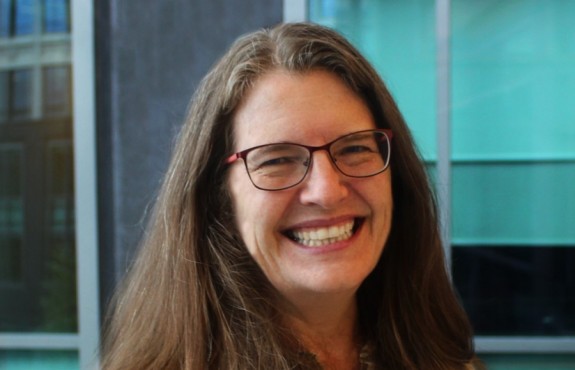
Kristin Olsen Kiser ’79 to Speak on Summer Internships and Postbaccalaureate Fellowships at NIH

By Matt Mandel ‘19
Ever wonder what it would be like to do research at the National Institutes of Health (NIH)? Kristin Olsen Kiser ’79 is coming to campus to speak about research training opportunities available to Kenyon students specifically for full-time post-baccalaureate fellowships and undergraduate summer internships in biomedical research at the NIH. Her 35-year employment history with the organization offers an invaluable perspective.
Since 1999, Kiser served as the NIH’s fellowship coordinator for the Office of Education, Division of Cancer Epidemiology and Genetics before recently retiring.
Born and raised in Cleveland Heights, Ohio, Kiser has spent most of her career in the Washington, D.C. area. After graduating from Kenyon with a B.A. in Sociology, Kiser worked for two years as an assistant for a neurosurgeon who was a partner at her father’s medical practice. Kiser said that she always loved hearing about her father’s work growing up, and this position allowed her to gain exposure to the medical field.
Kiser would eventually move to Columbus to earn her master’s degree in healthcare administration at the Ohio State University. After graduating, she accepted a one-year administrative fellowship at the NIH hospital. Following her fellowship, she stayed on for the next 35 years. Her first job was as the assistant administrator in facility management and over the decades, her career with the NIH would take her across the organization, from, legislative analyst, to assistant director at the Office of Loan Repayment and Scholarship, to program analyst at the Office of Research on Women’s Health, to acting-associate ombudsman for the Center of Cooperative Resolution, to program analyst at the Office of the Deputy Director for Intramural Research, and finally to fellowship coordinator. In 2009, she also went back to school to earn her second master’s degree in Community Counseling from The Johns Hopkins University.
A main focus of her work in the past 19 years has been bringing young scientists into biomedical research via research training programs. She helped to set up the Undergraduate Scholarship Program, which was established by Congressman Louis Stokes — the representative from Kiser’s home district in Cleveland Heights for 15 terms. The program reached out to underrepresented students in biomedical research such as women and racial minority populations. This program made Kiser interested in research training, where she spent the bulk of her career.
“A big focus in the last 25 years has been how to feed the scientific pipeline,” Kiser said, “which involved looking into who isn’t going into science, how to attract and retain those students in scientific fields.”
Kiser believes that Kenyon students should apply for a summer internship or post-baccalaureate fellowship if they are interested in gaining more experience with the biomedical research process. “It may be different than what people think,” she said. Though most of the opportunities are in wet labs, Kiser’s former division focuses on cancer epidemiology, studying the causes and cures for different cancers by working with large population databases.
“I think it’s important at this time in your life to explore as many different career opportunities as possible. Most of us who have an interest in science think about medicine … [NIH opportunities] give you an idea of what research is all about and that there are broader fields within the healthcare arena besides being in medicine … if you have an interest in biomedical research, a summer experience or post-baccalaureate fellowship is a good way to explore what it’s like,” Kiser said.
Kiser strongly believes that these NIH opportunities are great experience. The summer internship is a minimum of eight weeks, and in that time interns can work alongside top researchers as well as write a scientific poster and present it. The post-baccalaureate fellowships allow recent college graduates a one or two year opportunity performing full-time research at the NIH. Fellows work side-by-side with some of the leading scientists in the world in an environment devoted to biomedical research.
“Kenyon students definitely come with a strong writing background and good analytical skills. Kenyon students are thinkers and have an intellectual curiosity that is played out in small classes, which allow for more discussions than in larger schools. There is a rigor of study at Kenyon making it an academically challenging school. A Kenyon student coming to NIH for an internship knows how to work hard and be diligent,” she said.
Kenyon students are eligible to apply for summer internships and full-time one-to-two-year post-baccalaureate fellowships at the NIH. Both applications are available online. The summer internship program starts accepting applications in mid-November and closes usually in early March, while post-baccalaureate fellowships are accepted on a rolling basis. This fall, Kiser will talk about how to apply to both programs. To start, she recommends following the instructions online, taking your time with the application, and getting other people to proofread your materials as any mistakes or errors will impact your consideration in such a competitive environment. After going through the necessary steps, Kiser also recommends talking to a career advisor at the Career Development Office (CDO) to give your application a final review.
Kiser invites students to contact her at kiserkristin@yahoo.com with any questions about applying to the NIH. She'll be speaking to students on Tuesday, November 19 about NIH undergraduate and postbac research opportunities. Limited one-on-one sessions with Kiser are available at the CDO on November 19 and 20. To book one of these sessions, click here.